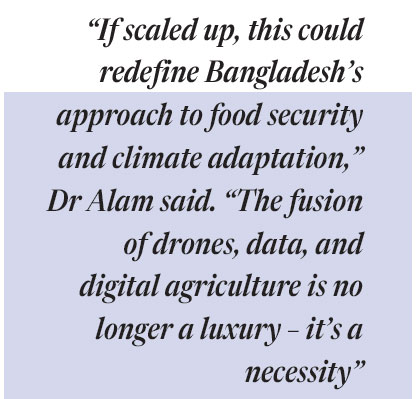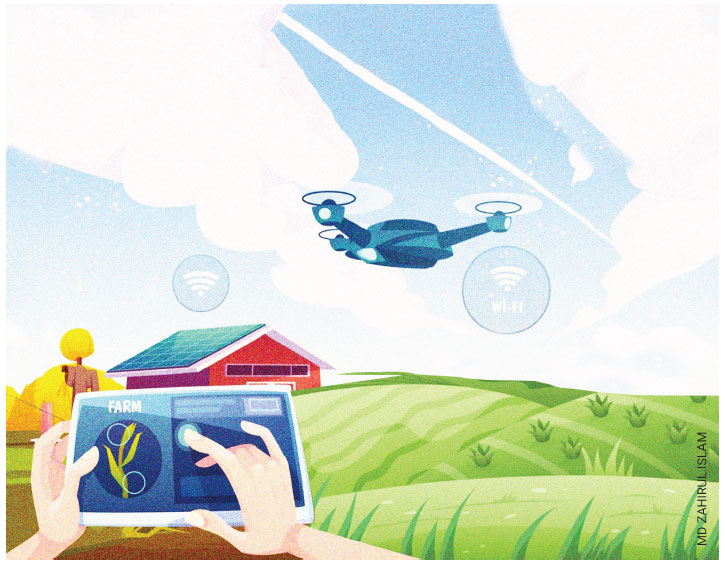
ARIFUL ISLAM
Bangladesh is turning to drone and digital technologies in an ambitious government drive to make its agriculture more climate-resilient and technology-driven.
The Climate Smart Agriculture and Water Management Project (CSA-WMP), led by the Department of Agricultural Extension (DAE), marks one of the country’s most advanced efforts to modernise farming practices.
The Tk106 crore initiative aims to boost crop intensity, improve irrigation efficiency and strengthen food security as farmers face increasing environmental and climate pressures.
Adapting agriculture to a changing climate
Launched in January 2022, the five-year project spans eight divisions, 17 districts and 27 upazilas, and is set to run until December 2026. Of the total cost, Tk21.28 crore is being funded by the Bangladesh government, while the World Bank is contributing Tk84.80 crore. The project received approval from the Executive Committee of the National Economic Council (ECNEC) in January 2022.
According to the Implementation Monitoring and Evaluation Division (IMED), the project had achieved 68% physical progress and 47.33% financial progress by March 2025. So far, nearly 30,000 farmers have benefited directly, with another 51,000 reached indirectly through technology demonstrations.
 Drone technology takes flight
Drone technology takes flight
A key feature of the project is the use of agricultural drones – a first for Bangladesh’s public-sector farming. Four advanced drones have been imported with World Bank support, and 15 drone pilots have completed intensive 21-day training.
“These drones will be used for field surveillance, fertiliser application and operations in hard-to-reach hilly areas,” said Project Director Khandaker Mohammad Rashed Iftekhar.
“Drone deployment allows us to monitor field conditions more efficiently and carry out precise interventions such as fertilisation. This marks a milestone in our journey towards future-ready farming,” he told Daily Sun.
Field trials have shown encouraging results. Crop intensity has risen by more than 5% in several upazilas – more than double the project’s initial target of 2%. Drone-assisted spraying has also cut labour costs and enabled more uniform crop management.
Beyond drones: building a full climate-smart model
The project combines a wide range of technologies beyond drones. These include alternate wetting and drying (AWD) irrigation, solar-powered pumps, rice transplanters, vermicomposting, organic fertiliser production, and salt- and drought-tolerant crop varieties.
It also promotes polynet houses for seedling production, drip and ribbon irrigation systems, and floating bed and Sorjan method vegetable farming in flood-prone regions. So far, the project has conducted over 14,000 technology demonstrations, built 36 mini polyhouses, and distributed 2,850 agricultural machines to farmers.

Empowering farmers through digital tools
A new farm management app is also being developed to help farmers record production data, manage equipment, track irrigation, and make informed decisions based on real-time data.
Training in GIS, IT, and procurement management is being provided to both farmers and agricultural officials to help them adapt to the new systems.
“We’re not just introducing machines – we’re building skills,” said Iftekhar. “Farmers are being equipped to manage digital tools and climate-smart practices with confidence and competence.”
Economic and environmental gains
Agricultural economist Dr Jahangir Alam described the project as “a turning point for sustainable agriculture in Bangladesh”.
“Drone technology can revolutionise precision farming by enabling targeted spraying, real-time crop monitoring, and rapid pest response,” he said. “It not only saves time and costs but also reduces environmental damage through more efficient resource use.”
He added that drone-based spraying reduces farmers’ exposure to harmful chemicals and improves pesticide accuracy – outcomes that enhance both food safety and public health.
Laying the groundwork for Vision 2041
The CSA-WMP is also setting up Climate Smart Schools, Clubs, and Villages – community platforms promoting sustainable and climate-adaptive farming practices.
By protecting soil health, reducing irrigation waste, and expanding renewable energy use, the project supports Bangladesh’s Vision 2041 goals of sustainable food systems and resilient livelihoods.
Experts say lessons from the project could guide future agricultural policies.
“If scaled up, this could redefine Bangladesh’s approach to food security and climate adaptation,” Dr Alam said. “The fusion of drones, data, and digital agriculture is no longer a luxury – it’s a necessity.”
______________________________________
The writer is a Senior Reporter at the Daily Sun. Email: [email protected]

